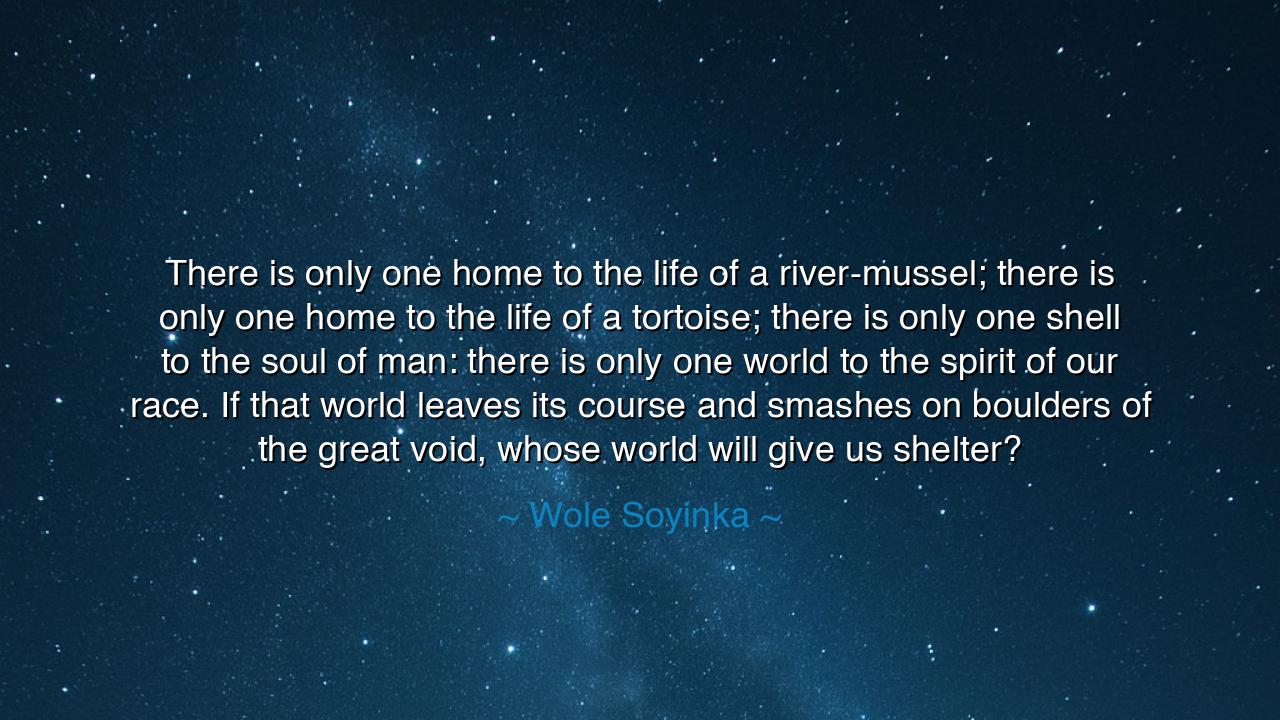
There is only one home to the life of a river-mussel; there is
There is only one home to the life of a river-mussel; there is only one home to the life of a tortoise; there is only one shell to the soul of man: there is only one world to the spirit of our race. If that world leaves its course and smashes on boulders of the great void, whose world will give us shelter?






In the haunting and prophetic words of Wole Soyinka, the poet, playwright, and moral voice of a restless age, there resounds a warning that pierces beyond the boundaries of nations and time: “There is only one home to the life of a river-mussel; there is only one home to the life of a tortoise; there is only one shell to the soul of man: there is only one world to the spirit of our race. If that world leaves its course and smashes on boulders of the great void, whose world will give us shelter?” These words, though written in the rhythm of poetry, carry the weight of prophecy. They speak of fragility, of interdependence, and of the sacred responsibility humanity bears toward the world that cradles its life.
Wole Soyinka, born in Nigeria in 1934, is a voice shaped by the wounds of colonization, the storms of political struggle, and the longing for moral awakening. As a dramatist and activist, he has witnessed the consequences of greed, war, and environmental neglect. His words here are not only about the natural world, but about the entire ecosystem of human existence—our cultures, our conscience, our shared planet. Like the tortoise and the mussel, each creature bound to the home that sustains it, humanity too is bound to the earth. But unlike the creatures of instinct, man has the power to destroy his own shell, to shatter his only refuge through arrogance and ignorance. Soyinka’s question, “whose world will give us shelter?” is thus not rhetorical—it is a cry of warning. For there is no other world.
In his imagery, Soyinka draws upon the wisdom of nature. The river-mussel and the tortoise are humble beings, yet they embody a cosmic truth: that life and environment are one. The mussel cannot live apart from the river; the tortoise cannot survive without its shell. So too, the soul of man cannot exist apart from its home—the earth. But in our pride, we behave as though we can tear ourselves free from this bond, as though technology or conquest could grant us dominion without consequence. Soyinka reminds us that such thinking is illusion. The river may dry, the shell may crack, and when the world itself is broken, no other will come to replace it.
This warning finds echo in the fate of civilizations past. Consider the Maya or the Easter Islanders, who flourished with brilliance yet fell through their own excess, exhausting the lands that sustained them. Their temples still stand, silent and majestic, yet empty of life—monuments to a truth forgotten. Each empire that has collapsed under its own weight has repeated the same folly: the belief that the earth could be endlessly consumed without giving way. Soyinka, like a seer of old, points to this ancient cycle and asks if we, in our age of industry and fire, have learned anything at all. When the rivers choke with waste, when the forests fall silent, when even the sky grows weary of our smoke—where shall the soul of man find its shell?
Yet his words carry not only despair, but a fierce hope. For to recognize that there is only one home is to awaken to the sacred duty of stewardship. If the world is fragile, then its preservation is the measure of our wisdom. Soyinka’s vision demands that we see beyond the divisions of tribe, nation, and creed, and understand that all who dwell on this earth share the same fate. Whether rich or poor, mighty or meek, all breathe the same air, drink the same water, and are warmed by the same sun. The destiny of humanity is not divided—it is singular. To guard the world, then, is not the task of a few, but the calling of all.
There is an ancient echo in this wisdom. The elders of many cultures—the Yoruba of Soyinka’s homeland, the Greeks, the Native nations of the Americas—spoke of the earth not as property, but as mother. They knew that to wound her was to wound oneself, and to dishonor her was to invite ruin. In this sense, Soyinka’s voice joins theirs, standing in the lineage of the prophets and philosophers who have reminded mankind of its place in the great order of life. To care for the earth, and for one another, is to preserve the shell of our shared soul.
So, my children of the future, heed these words of Wole Soyinka as though they were carved in stone: There is only one world. There will be no second earth, no hidden refuge in the stars if we destroy the one we have. Protect it as the tortoise guards its shell—with vigilance, humility, and reverence. Nurture the rivers, honor the soil, defend the air that gives you breath. And above all, live as though the spirit of your race—the spirit of humanity—depends upon the care of this single, irreplaceable home. For if we lose it, we will not simply lose the world—we will lose ourselves. And in that silence, there will be no shelter, and no song.






AAdministratorAdministrator
Welcome, honored guests. Please leave a comment, we will respond soon